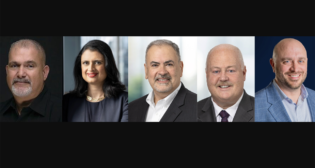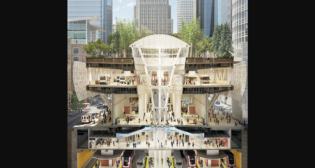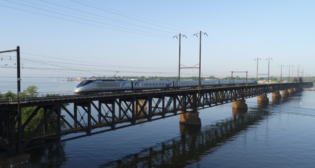
RUN Fall Conference Focus: Rail Environmental Benefits
Written by David Peter Alan, Contributing EditorFifty years ago, I was riding the Central Railroad of New Jersey on a train consisting of “commuter” cars that were, themselves, 50 years old. Somebody had affixed a bumper sticker to one of the windows on that train that said: “Pollution Solution. Ride CNJ.” The thought behind the message was certainly correct, but I have never seen another like it, before or since. It was a part of the dawn of environmental consciousness in this country, a mere three years after the first Earth Day observance.
Many rail advocates are aware of the environmental benefits of rail travel, whether local or for a long trip, as well as for freight. The same advocates are also aware of the increased environmental benefits that stem from electrified rail lines, even though there few in the United States (especially outside the Northeast Corridor) and even fewer in Canada. While many environmental supporters call for electric power to run private automobiles, they often overlook the greater benefits of traveling and shipping by rail. While there is some crossover between rail and environmental advocacy, more would be helpful.
Toward that end, the Rail Users’ Network (RUN) will focus on the nexus between passenger rail and the environment at its on-line conference that will take place on Saturday, Oct. 21, starting at 12:30 PM, Eastern time. The theme of the conference will be: “Passenger Rail & The Environment – Natural Allies” and its subhead is “Environmental benefits of passenger rail / rail transit in North America.”
For the past three years, RUN’s conferences, which take place on line during the spring and fall, have focused on trains, transit, and advocacy in different regions of the United States and sometimes in Canada. This conference will be different. It will focus on efforts by rail advocates to spread the word about how passenger trains and rail transit help the environment, with an emphasis on bringing environmental advocates onto the rail and transit bandwagon.
RUN Chair Richard Rudolph, who also advocates for better rail service locally in Massachusetts and Maine, told Railway Age: “Given the mad rush to convince people to purchase electric cars, it is past time to educate the public about the need for an upgraded and expanded passenger rail network to reduce carbon emissions. Electric cars and wider highways are not the only answer. This forum highlights the role of rail in helping mitigate the existential climate crisis as well as how it can provide viable and accessible options for those without automobiles and those unable to drive.”
Rudolph will open the conference with a presentation about RUN’s thoughts concerning the FRA’s Long Distance Rail Study Committee’s efforts toward expanding long-distance services on Amtrak. The rest of the conference will be devoted to environmental issues as they pertain to trains and rail transit.
Several presenters are affiliated with the Sierra Club, and a number are Californians, with some crossover between those groups. Brian Yanity, a RUN Board member and Vice-President (South) of the Rail Passengers’ Association of California (RailPac), led a Working Group that produced a report for the Sierra Club that provided an in-depth study of the benefits of rail. He will talk about the need for electrifying railroads and the benefits that rail can bring generally as a climate and environmental solution. Yanity told Railway Age: “During the past year and a half, I led an effort of dedicated Sierra Club volunteers, along with a couple of Club staff members and volunteers who are not Club members, in writing the Sierra Club Rail Transportation Statement, which was released in early August 2023 by the Clean Transportation for All Campaign. Our amazing team of volunteers from all over the US was exceptionally dedicated, bringing a variety of backgrounds and experiences in environmental activism and transportation advocacy, including some with decades of professional railroad experience.”
Darrell Clarke, who was also a member of the Working Group and who is Transportation Chair of the Los Angeles Sierra Club chapter, will talk about the history of Metro’s Expo Line to Santa Monica and its environmental significance. Katherine J. Garcia, Director for Clean Transportation at the Sierra Club, will provide an overview regarding the environmental benefits of passenger rail and rail transit.
Other presenters will discuss their efforts and those of their organizations to promote rail and transit as “green” modes of transportation. Peter Cole, representing advocates in Maine with the Maine Rail Group and TrainRiders Northeast, will present an update on the on-going struggle to save Maine’s state-owned rail lines from being torn up and converted into bicycle and walking trails without trains. From the other side of the country, Barry Scott, a Board member of Coastal Rail Santa Cruz will talk about the effort to establish a “trail with rail” along the coastal side of an existing rail line. Santa Cruz is a beach town about two hours south of the San Francisco area. Thomas White, a rail consultant who is also Co-Chair of the Climate Rail Alliance, will present his concept of “Toll Roads for Trains.”
Besides the battle between environmentalists who understand the benefits of increased use of rail and those who see the future as including electrified private vehicles rather than trains, one of today’s most-contentious issues regarding transportation and the environment is Congestion Pricing, the policy of charging a toll for motor vehicles to enter a city’s urban core. The battle over a planned congestion toll is in full swing in New York City, where it is slated to be implemented next year, and in New Jersey, where Gov. Phil Murphy and other elected officials are fighting as hard as they can to prevent it.
The plan’s supporters point to successes in Europe and Asia, and claim that the toll will reduce traffic congestion in Manhattan (south of 60th Street), improve air quality, and give the Metropolitan Transportation Authority (MTA) urgently-needed capital funding to help keep the subways and railroads that serve New York City in a state of good repair. Michael Wojnar, Senior Advisor for Innovation and Policy at the MTA, will talk about the anticipated benefits of the toll for transportation and air quality.
As is customary at RUN conferences, there will be a “Public Forum” where attendees can express their own comments and suggestions concerning the subject matter of the conference. Following that, I will deliver the closing remarks at the conclusion of the conference.
According to RUN, “The conference is designed not only for rail advocates, but also for civic and business leaders, environmentalists, planners, real estate developers, and members of the general public who are interested in knowing more about passenger rail and rail transit in America.” Registration is now open on the the RUN website. Admission to the conference is free for RUN members, and $25.00 for non-members. The “non-member” rate includes a one-year membership in RUN. The is RUN’s introductory rate for new members, equal to the cost of attending the conference alone, but including other benefits of membership, including the RUN Newsletter and next year’s conference(s).
RUN is concerned about the environment, and has promoted the environmental, economic, social, and personal benefits of passenger trains and rail transit since it was founded 25 years ago. Recently, the organization stepped up its efforts to promote rail and the environment by forming a new Environmental Committee when its Board met last August. This conference is part of RUN’s efforts to bring advocates for more trains and better transit together with advocates for a better environment, in the hope of establishing those groups as the “Natural Allies” that RUN believes they should be.



